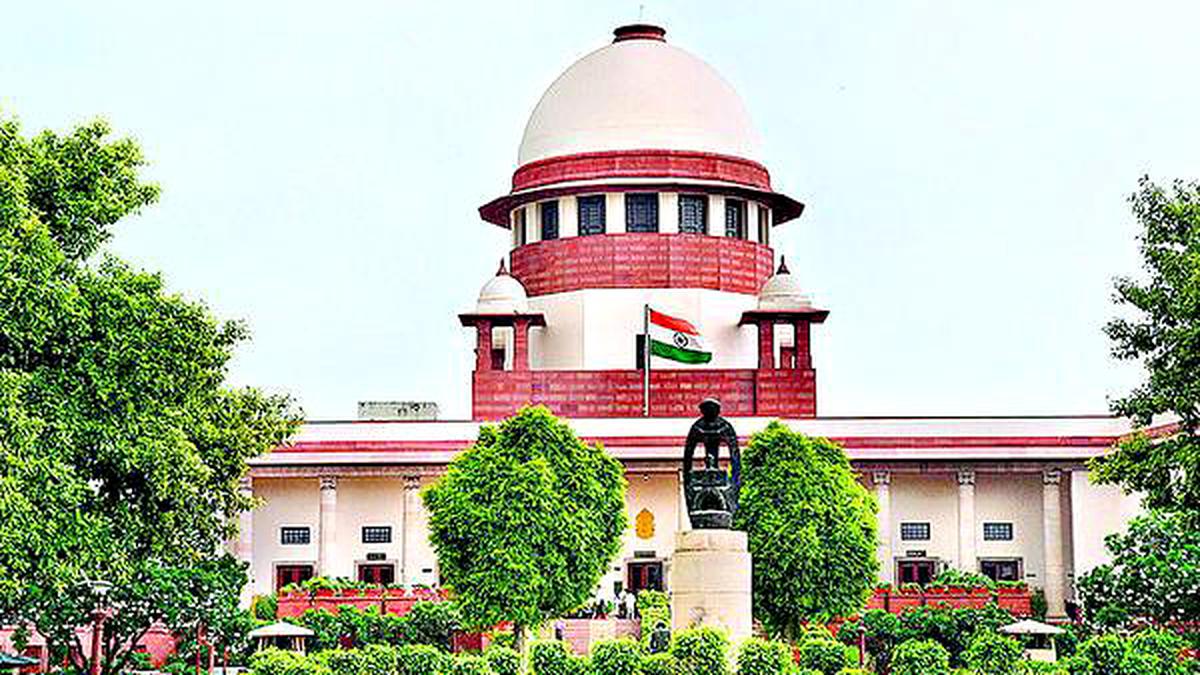Anti-conversion law | Not all religious conversions are illegal, Supreme Court remarks

The Supreme Court on January three located that each one spiritual conversions can not be presumed with the aid of using a State to be unlawful whilst agreeing to listen a Madhya Pradesh authorities enchantment towards a High Court choice freezing a obligatory provision requiring someone who wants to convert to every other religion to offer 60 days` earlier intimation to the neighborhood District Magistrate.
A Bench led with the aid of using Justice M.R. Shah issued note however refused to reserve an period in-between live of the High Court order while Solicitor General Tushar Mehta, for Madhya Pradesh, argued that “conversion withinside the u . s . is primarily based totally on marriage”.
The provision beneathneath query is Section 10 of the Madhya Pradesh (Freedom of Religion) Act, 2021. Section 10(1) and (2) of the Act mandated that someone who wants to convert and a priest/individual who intends to organise a conversion, respectively, must deliver a two-month earlier assertion to the District Magistrate that the proposed extrade of spiritual religion isn’t always inspired with the aid of using pressure, undue influence, coercion or allurement. A individual who desires to organise a conversion and refuses to offer the sort of assertion could go through penal consequences, which incorporates imprisonment of 3 to 5 years and charges of now no longer much less than ₹50,000.
Mr. Mehta stated, conversion in large part took place withinside the u . s . with the aid of using marrying someone of every other religion. The provision did now no longer ban inter-religion marriage however handiest acted as a shield towards forcible or unlawful conversion.
The regulation officer contended that Section 10 of the 2021 Act turned into in pari materia (at the identical challenge matter) with Section five of the Madhya Pradesh Dharma Swatantrya Adhiniyam of 1968, which turned into upheld with the aid of using a Constitution Bench of the Supreme Court in a judgment in Rev. Stainislaus as opposed to State of Madhya Pradesh in 1977.
Mr. Mehta submitted that the 1977 verdict had held that the word `propagate` in Article 25 of the Constitution did now no longer deliver “the proper to transform every other individual to one`s very own faith, however to transmit or unfold one`s faith with the aid of using an exposition of its tenets”. The Constitution Bench had held there turned into “no essential proper to transform every other individual to one`s very own faith”. Freedom of faith turned into now no longer assured in recognize of 1 faith handiest, however protected all religions alike.
He advised the courtroom docket to as a minimum repair the implementation of Section 10 of the 2021 Act to the quantity that the intimation to District Magistrates can also additionally continue. He stated the High Court had gravely erred in now no longer thinking about the bigger public hobby concerned towards the behavior of unlawful spiritual conversions thru pressure or deceit.
“But now no longer all conversions are unlawful…” Justice Shah remarked orally.
The Bench stated it might observe the petition and the query of granting period in-between remedy withinside the subsequent listening to on February 7.
A collection of petitions are being filed towards legal guidelines enacted with the aid of using States, inclusive of Uttar Pradesh, Uttarakhand, Himachal Pradesh, Madhya Pradesh and Gujarat, making it obligatory for folks looking for to transform to offer earlier assertion.
On Monday, NGO Citizens for Justice and Peace approached the apex courtroom docket in an same case regarding an Uttarakhand regulation. Senior recommend C.U. Singh argued earlier than every other Bench led with the aid of using Chief Justice D.Y. Chandrachud that the State`s interference amounted to a shrink at the essential proper of someone to pick out a accomplice of his or her choice. The Chief Justice Bench has sought information of all such instances and their fame in diverse High Courts.
Mr. Singh, on Tuesday, had mentioned that such Acts had been being enacted one after the alternative and contained same provisions.
In the present day case, the Madhya Pradesh High Court, on November 14, had located robust prima facie motives to furnish residents safety towards the coercive movement the State ought to take beneathneath Section 10 of the 2021 Act.
“Section 10 makes it compulsory for a citizen needing conversion to offer a assertion on this regard to the District Magistrate, which in our opinion is ex facie unconstitutional… Thus, until similarly orders, the respondent [Madhya Pradesh] shall now no longer prosecute person residents in the event that they solemnise marriage on their very own volition and shall now no longer take coercive movement for violation of Section 10 of Act of 2021,” the order had read.
In December, the Gujarat Government, buoyed with the aid of using an oral statement with the aid of using the Supreme Court that forcible or fraudulent spiritual conversion could in the end have an effect on country wide security, had driven for the revival of a provision in its State regulation which required a District Magistrate`s earlier permission for changing or “taking part” in a rite regarding spiritual conversion.
The operation of Section five and numerous different key provisions of the Gujarat Freedom Of Religion Act, 2003 turned into stayed with the aid of using the State High Court in August 2021.
